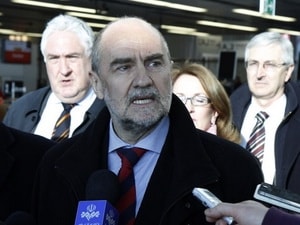IAEA returns to Iran for nuclear talks
On the morning of January 16, a delegation of eight experts from the International Atomic Energy Agency (IAEA) led by IAEA Deputy Director General Herman Nackaerts arrived in Tehran in an effort to resolve long-standing disagreements with Iran over its controversial nuclear program.
On the morning of January 16, a delegation of eight experts from the International Atomic Energy Agency (IAEA) led by IAEA Deputy Director General Herman Nackaerts arrived in Tehran in an effort to resolve long-standing disagreements with Iran over its controversial nuclear program.
Speaking in Vienna (Austria) on January 15 before leaving for Tehran, Mr. Nackaerts expressed hope that Iran would cooperate with the delegation in a "constructive" spirit. On the same day, Iranian Foreign Ministry spokesman Ramin Mehmanparast said that Tehran hoped to reach a comprehensive agreement with the IAEA in this new round of negotiations, but this would only be possible if the IAEA recognized Iran's "nuclear rights."

Mr. Herman Nackaerts and his delegation. (Source: AP)
Mr. Mehmanparast also rejected the IAEA delegation's chance to access the Parchin military base near Tehran, which the IAEA suspects is a site for nuclear weapons testing.
According to a Western diplomat, there are still some significant disagreements between the IAEA and Tehran. The IAEA wants Iran to respond to what it calls "comprehensive and credible evidence" of nuclear weapons research that Tehran conducted until 2003 and may have continued since. Iran has always denied that it is seeking an atomic bomb.
Meanwhile, nuclear negotiations between Iran and the P5+1 group (including the UK, China, France, Russia, the US and Germany) are currently at a standstill. At the most recent talks held in Moscow, Russia in June 2012, Tehran opposed the P5+1's call for Iran to stop uranium enrichment activities and asked the West to ease sanctions against Iran.
Iranian media reported that representatives of the country and the P5+1 group may meet in February in Istanbul, Türkiye. However, the Chairman of the Iranian Parliament's National Security and Foreign Policy Committee, Alaeddin Boroujerdi, said the final decision still has to wait for Iran's Supreme National Security Council. According to him, this negotiation, if held, must aim at the ultimate goal of lifting the "unreasonable and unjust" embargo imposed by the US and the European Union (EU) against Iran./.
According to (TTXVN) - DT






